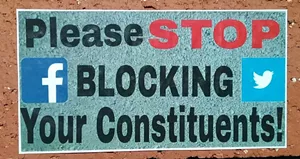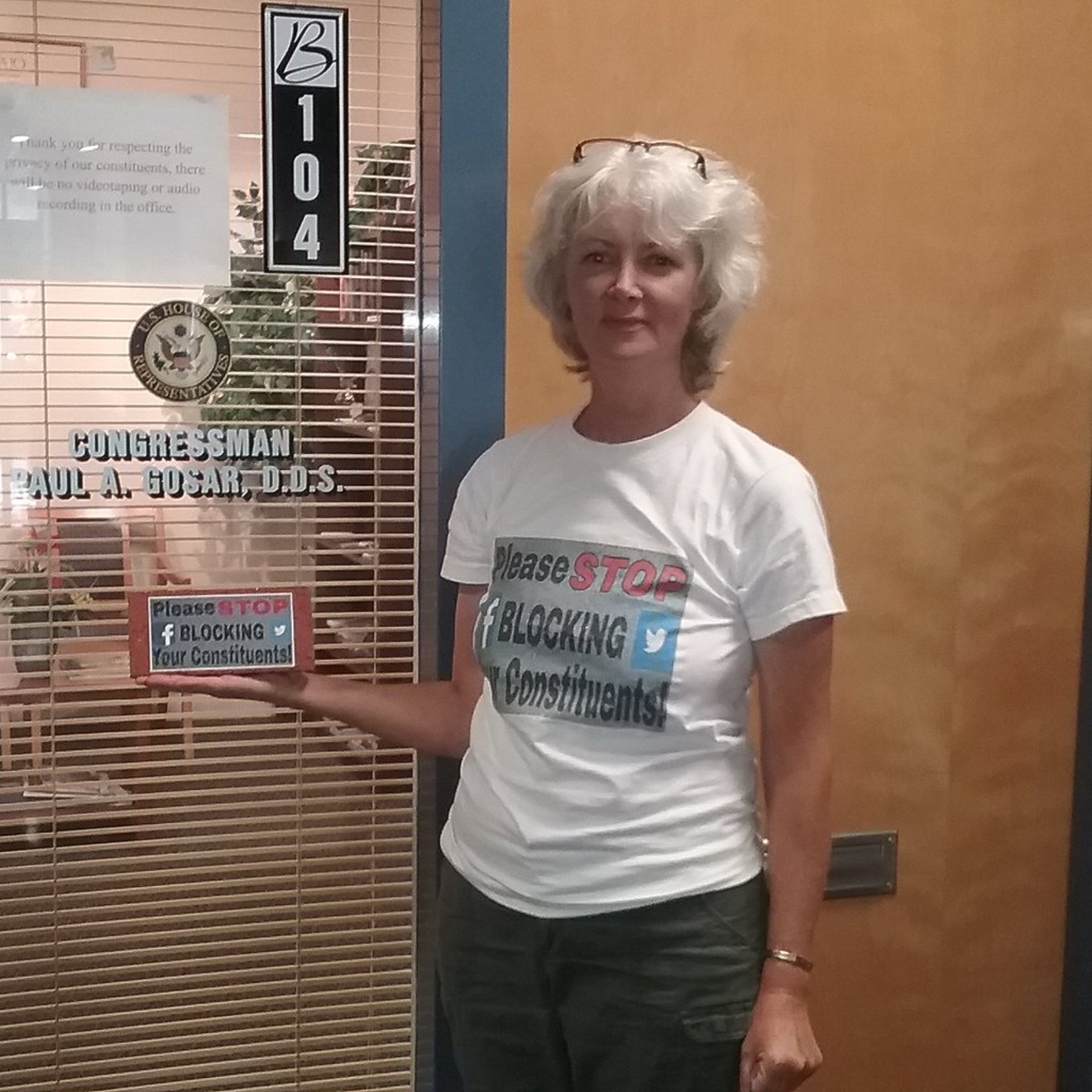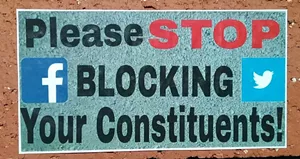Morgaine, the founder of Indivisible Kingman and an outspoken liberal activist, was outraged.
"The hardest part of this whole situation is that I am a U.S. Army veteran," she says. "During my three years of service, I willfully relinquished all of my civil liberties. Once I was honorably discharged, I got all of those rights back.
"So, I am not going to let some self-absorbed member of Congress block me from participating in the democratic process. I paid a price much higher than an average citizen ever does for my rights, and I will fight to have them respected and upheld."
Since then, she's started a campaign to get Gosar to unblock her: She shows up at his Prescott office several times a week to drop off a literal block made of concrete or brick. Each is decorated with a message that says, "Please stop blocking your constituents."
Morgaine was a regular commenter on Gosar's Facebook page up until a few months ago, so she's not sure which of her posts got her blocked.
"Most of my posts were 'Please vote no on such and such an initiative,'" she says. "But there were angry sarcastic posts, as well."
The word "fuckwadery" may have been used in one of her comments, she acknowledges. "They're blunt. Politically to the point. Not warm and fuzzy. I understand why he would want to block my voice. But that doesn't give him the right to."
In fact, whether elected officials have that right is something that has yet to be extensively litigated in court. It's a relatively new issue that's emerged as politicians start to rely more and more on social media as a way to communicate with constituents.
But there's a strong argument to be made that blocking critics is a form of censorship, and a violation of the First Amendment.
Back in February, the American Civil Liberties Union of Maryland sent a strongly worded letter to Governor Larry Hogan on behalf of a group of otherwise unconnected women who had their comments deleted and were blocked from viewing his Facebook page when they raised concerns about his policy positions.
Courts have consistently ruled that comments made on social media are subject to the same First Amendment protections as any other kind of speech, the ACLU pointed out.
"As such, the government, and you as Maryland’s Governor, may not legally establish a social media site as a forum for dialogue with constituents, then selectively censor who may speak in that forum based on the viewpoint expressed," the ACLU warned.
Shortly afterward, Hogan's aides began unblocking people.
Representatives for Gosar didn't respond to questions sent by Phoenix New Times about whether they believe their policy to be constitutional. They did point to the social media policy posted on his Facebook page, which states that comments that include profanity, name-calling, threats, and personal attacks will be deleted.

Morgaine says she was given the list by Gosar's office staff when she asked why she'd been blocked from viewing and commenting on his public Facebook page.
J'aime Morgaine
Along with "Engage in hate speech" and "Use racial slurs," it includes "Express rage or anger" and "Express treasonous or dangerous thoughts." She wasn't told which category she fell into.
Since beginning her protest and publishing a letter in the Kingman Daily Miner, she's heard from a number of other people who've been blocked, with no explanation, after they criticized Gosar's policies on Facebook or Twitter.
And he's hardly the only member of Congress who's guilty of attempting to stifle dissenting voices.
On Sunday, Susan Hudson, who co-chairs the Indivisible group in Arizona's 9th Congressional District and is also active with Stronger Together Arizona, tweeted that she was going to start a list of people who'd been blocked by their elected officials. She ended up getting hundreds of replies from people around the country, which she's still working on cataloging.Day 1 of the "Gosar Blocks" protest campaign. I'll deliver a block message 3x/week to his office until he STOPS blocking voices of dissent!! pic.twitter.com/Qs6dMZstx5
— Indivisible Kingman (@IndivisibleCD4) May 12, 2017
Among the offenses that had gotten people blocked from viewing their representative's Facebook posts and Twitter feeds:
• Pointing out factual inaccuracies in a tweet.
• Asking them to investigate Trump's ties to Russia.
• Asking them to support a jobs and infrastructure bill that Obama proposed.
• Using the hashtag #DoYourJob.
Based on the number of messages she's received about him, Gosar seems to be the most aggressive Arizona politician when it comes to blocking people, Hudson notes.
But he's hardly the only one doing it.I have been blocked on facebook by Paul Gosar. I never even commented on his posts. Just snail mail.
— JMasse (@jennifer_masse) May 29, 2017
After the state Legislature passed a controversial proposal to expand the school voucher program in early April, Carrie Brown noticed that she and a handful of other education activists had been blocked on Twitter by their state representative, Jill Norgaard, as well as by Phoenix Representative Kate Brophy McGee.
They didn't receive any explanation, but the common thread between the activists was that they had all opposed the ESA bill and had let Norgaard and Brophy McGee know it by tagging them in their tweets.
"I think it’s weird," Brown tells New Times. "It just seems really over the top. All you have to do is log out, Google their Twitter, and you can see everything. It’s not like they’re hiding."
Norgaard later unblocked her, and told New Times that the block "was an error and has been corrected."
But Brown is still blocked by Brophy McGee, to her surprise.
"She and I have had a good relationship at the Legislature," Brown says. "Even after the Senate vote was done, she reached out and hugged me, for consolation."
McGee declined to answer questions about her blocking policy, but told New Times in an email that constituents are welcome to contact her by phone or email, or at her office hours.
"My Twitter account is not a legislative account," she wrote. "It is my personal Twitter account, which I maintain." (Given that her Twitter bio states, "It is an honor to represent Legislative District 28," this seems like a dubious distinction.)
Norgaard and Brophy McGee are both Republicans, which seems to be a common theme. When New Times put out a call to readers asking if they'd ever been blocked on social media by an elected official, all the responses that we got named Republican politicians — at the city, state, and federal levels.
That's likely a result of fact that there's been a surge of liberal activism in the months since the election — and the reality that the majority of people who hold elected office in Arizona are Republicans. (It also probably shows that our readership tends to lean to the left — but, if you've ever been blocked for criticizing a Democrat, please tell us about it!)My #LD18 Rep @JillNorgaard blocked me and several other constituents all unhappy about her #ESA vote. She unblocked us. I thanked her.
— Carrie Brown (@Carrie___Brown) April 10, 2017
And back in April, Arizona Capitol Times reporter Hank Stephenson tweeted that Rep. Jesus Rubalcava — a Democrat who's currently in danger of losing his seat over alleged campaign finance violations — had blocked him on Twitter, proving that this behavior isn't limited to Republicans.
Nonetheless — and despite the constitutional issues that it brings up — being blocked from interacting with politicians on Facebook or Twitter has become a badge of honor among some liberal activists. They say it proves that they're managing to get under Republicans' skin. (See: the reaction to the news that Trump had blocked a Jimmy Kimmel Live writer after she made a series of jokes at his expense.)
Brown's response after discovering that several state representatives had blocked her on Twitter?
"Honestly, I was kind of thrilled."













